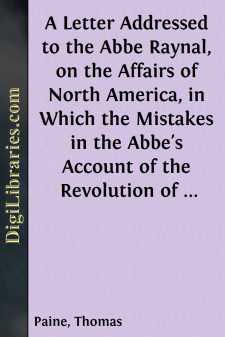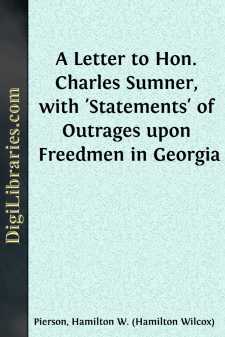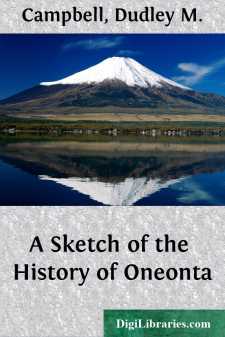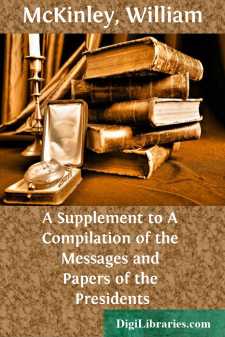History
- Africa 30
- Americas (North Central South West Indies) 50
- Ancient 68
- Asia 58
- Australia & New Zealand 8
- Canada 41
- Caribbean & West Indies 1
- Civilization 20
- Eastern Europe 12
- Europe 310
- Expeditions & Discoveries 60
- General 77
- Historical Geography 1
- Jewish 9
- Latin America 3
- Medieval 8
- Middle East 13
- Military 248
- Revolutionary 8
- Study & Teaching 5
- United States
- Western Europe 56
- World 13
United States Books
Sort by:
by:
Thomas Paine
INTRODUCTION A London translation of an original work in French, by the Abbe Raynal, which treats of the Revolution of North America, having been reprinted in Philadelphia and other parts of the continent, and as the distance at which the Abbe is placed from the American theatre of war and politics, has occasioned him to mistake several facts, or misconceive the causes or principles by which they were...
more...
LAWLESSNESS IN GEORGIA. Washington, D. C., March 15, 1870. My Dear Sir: It would not become me to express an opinion upon any of the legal questions involved in the Georgia bill now before the Senate, but I respectfully call your attention to the following "statements" of facts. I certainly am not surprised that Honorable gentlemen whom I greatly esteem, should express their belief that the...
more...
PREFACE. In commencing the attempt to portray a very remarkable career I had hoped for the coöperation of the person concerned so far, at least, as the supervision of any statements I might find it necessary to make. But it was decided by her friends that it would not be well for her at present to be troubled with new projects, or even informed of them. It was at first a serious disappointment to me...
more...
This restoration of a portion of the original track of theLexington and Ohio (now Louisville and Nashville) Railroadlaid at Lexington in 1831, is dedicated to those men offorethought and courage who were pioneers in railroaddevelopment in America. Erected Anno Domini MCMXVI. Dedication Exercises 10 A. M. May 30, 1916 College of Mechanical and Electrical Engineering University of Kentucky During the...
more...
by:
A. Woodward
INTRODUCTION. SECTION I. Since the following chapters were prepared for the press, my attention was directed by a friend, to a letter published in a Northern paper, which detailed some shocking things, that the writer had seen and heard in the South; and also some severe strictures on the institution of domestic slavery in the Southern States, &c. I have in the following work, related an anecdote...
more...
eorge Washington, the Father of his Country, is equally the Father of Pittsburgh, for he came thither in November, 1753, and established the location of the now imperial city by choosing it as the best place for a fort. Washington was then twenty-one years old. He had by that time written his precocious one hundred and ten maxims of civility and good behavior; had declined to be a midshipman in the...
more...
CHAPTER I. The territory comprised within the present boundaries of the town of Oneonta, previous to the war of the Revolution, was little known except as the scene of many a sanguinary conflict between different Indian tribes which contended with each other for its possession. The Delawares, whose home was on the river bearing their name, had been in peaceful possession of the upper Susquehanna valley...
more...
by:
Osmond Tiffany
Mr. President: The events of the American Revolution are so nearly connected with our own times, that the actors in that great struggle seem yet to be to us as living men. We open the portal of the past century, and are with those who once like ourselves, breathed and thought, and who now, lie not silent or forgotten in the tomb. Their deeds live in our memory; their examples are glorious as of old:...
more...
by:
William McKinley
William McKinley (For portrait and early biographical sketch see Vol. X, pp. 125, 126, 127) At the National Republican Convention which met at Philadelphia in June, 1901, William McKinley was again nominated the Republican candidate for the Presidency of the United States. At the November election he was re-elected, receiving 292 electoral votes, against 155 votes for William J. Bryan. In September,...
more...
Infantry attacks with its fire, or with the bayonet. Which of these is the more effective? 1. The object of an attack is to destroy or capture the hostile force, or, at least, to drive it from the field. Capturing the enemy, or driving him from the field, cannot usually be effected by merely firing upon him. True, a mere fire at a distance may finally destroy him. But an insuperable objection to this...
more...











